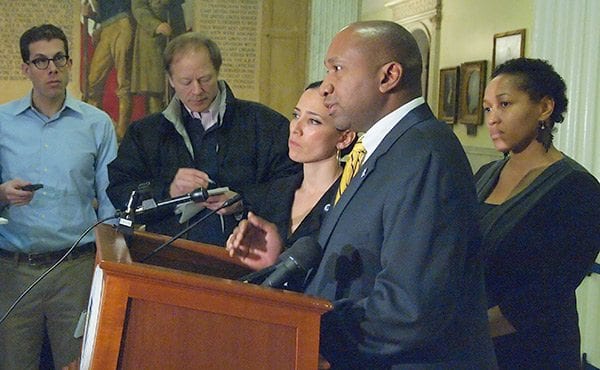
A battle between charter school supporters and public school parents came to a head last week, but the event that precipitated the dustup was an attempt at compromise.
As the budget season has heated up on Beacon Hill, charter school backers have been pressing lawmakers to lift the cap limiting the number of charter schools in the state, which would allow charters to expand. On the other side, school department officials, superintendents, school committee members and municipal officials from across the state have been urging the legislature to keep the cap in place, arguing that the charters are drawing funding away from the schools at a time when the state’s Chapter 70 education funding has declined sharply.
Last week Rep. Russell Holmes, a vocal supporter of charter schools, and Sen. Sonia Chang Diaz crafted a compromise bill that would tie the lifting of the cap on charter schools to the districts receiving full state reimbursement for the funds lost to the charter schools.
While the bill generated headlines, it also generated heat, drawing condemnation from charter school supporters who flooded the State House with letters from parents. At the same time, hundreds of parents of Boston school children pressed lawmakers to leave the cap intact, circulating an online petition that has so far netted 2,700 signatures.
At a State House press conference, Holmes, Chang Diaz and other supporters of the the Holmes/Chang Diaz bill stressed the importance of securing adequate funding for both charter schools and conventional public schools.
The current funding system pits charters against the other schools in the districts in which they operate, noted Mariama White Hammond, who has nieces in charter and public schools.
“This bill says, ‘let’s put charter and regular schools in the same boat so we can row together,’” she said.
Charter schools receive public funding from the school districts in which they operate, but are not subject to direct control from the districts. Charter schools do not operate under union contracts, so principals are free to hire, fire and set personnel policies.
Students are admitted to charter schools by lottery. When a student enters a charter school, the local school department is required to pay the charter at a rate commensurate with the district’s per-pupil spending. While state law requires that the Commonwealth reimburse the district fully for the first year, then at 25 percent for the next three years, the state has never met that obligation.
Speaking in support of the compromise legislation, state Sen. Linda Dorcena Forry said she would like to see adequate funding for all 56,000 children in Boston’s public school system.
“We want to make sure that the funding is there to support all the schools,” she said.
Response to the Holmes/Chang Diaz amendment was swift. Members of a coalition of charter school supporters were on hand to denounce the measure during the press conference.
Candace Barker, whose daughter attends the Brooke charter school in Mattapan, said the school was the only well-performing school she had access to.
“I didn’t like the options I had as walk-to schools,” she said. “I wanted to increase the odds I could get a quality school for my daughter. I feel what my daughter has, everyone should have access to.”
The district school supporters, who were not in the State House in force last week, said the funds new charters would take from the school system would lead to more cuts.
“They’re cutting everything,” said Sara Barcan, who has two children in district schools. “They’re cutting physical activities, supplies. You have schools running out of copy paper in March. This is not the time to lift the cap on charter schools.”
In the end, Education Committee Chairwoman Alice Peisch pulled the plug on the Holmes/ Chang Diaz compromise, advancing a bill that would allow for charter school expansion without tying the expansion to state reimbursements.
While it’s not clear whether the Legislature will reach a compromise on lifting the cap on charter schools, Chang Diaz said the level of citizen engagement is encouraging.
“In the long term, it’s a positive development to see this level of parent organizing,” she commented.







